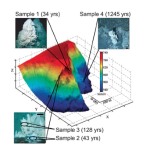
Ransom A. Myers passed away this previous Tuesday. Coincidently, a reader recently asked how we know that shark populations are declining and what the affect this decline is on other marine populations? Largely, I can answer these questions because of the research that Myers both originated, inspired, and participated in.
In 2003 a study lead by Baum, and coauthored with Myers and others, demonstrated that prompt and considerable declines in large-sized shark populations occurred in the Northwest Atlantic. This included hammerheads, white, and thresher sharks estimated to decline 75% in less than 15 years. All the recorded sharks species in the study, with the exception of makos, exhibited a decline of greater than 15% in the past 8-15 years. As the authors note this is in addition to declines that Jackson wrote about in 2001. “Paleoecological, archeological, and historical reconstructions [that] demonstrate incredible losses of large vertebrates and oysters from the entire Atlantic coast. Untold millions of large fishes, sharks, sea turtles, and manatees were removed from the Caribbean in the 17th to 19th centuries.” In the same year Myers lead a study, coauthored by Worm, demonstrating that industrialized fisheries reduced biomass by 80% within 15 years. In a large meta-analysis it was observed that predatory fish biomass was 10% of pre-industrial levels. By 2004, Meyers coauthored another study, with Baum, demonstrating that at least two species of sharks, whitetip and silky, from the Gulf of Mexico experienced the same fate as North Atlantic species, declining over 90% in population numbers.
Published this month, Myers published with others the effects of the declining shark populations on marine ecosystems in the NW Atlantic. Myers’ found that as 11 shark species declined over 35 years that 85.7% of there prey increased in numbers. This ultimately led to a trophic cascade. As cownose ray numbers increased, their prey, bay scallops, decreased (More over at A Blog Around the Clock). What should be good news, decreasing shark attacks on humans despite our population growth, may mark the declines Myers warned of.
“Humans have always been very good at killing big animals. Ten thousand years ago, with just some pointed sticks, humans managed to wipe out the woolly mammoth, saber-toothed tigers, mastodons and giant vampire bats. The same could happen in the oceans.”-R.A. Myers
More on Myers’ life at the L.A. Times.






thankyou.
That’s sad. Thanks for passing on the information.
In regards to one of the articles you posted:
The surfers have actually jumped over bull sharks there and at Daytona Beach on occasions. At New Smyrna, it’s all the fishing boats throwing out chum and old bait that helps attract them as they come into the inlet from their fishing trips. (I’m familiar with the area since we have a house in Vero Beach further down and the surfers are very good for shark anecdotes.)
I knew Ram from graduate school, where he would often visit folks in my department. As someone who works with commercial fisheries, I often professionally disagreed with his conclusions, but never with the man himself, who I found almost infectious in his enthusiasm.
There’s also no doubt that he had a lasting impact upon the field by stimulating debate. One of my fellow graduate students brilliantly summed up Ram’s work thusly: “Sometimes it takes an outlier to move the mean.”
Godspeed, Ram. You’ll be missed.
Ram’s last name was spelled Myers not Meyer. There is a blog on Ram at http://www.fansofram.blogspot.com
Susan,
Thank you for catching my spelling error. And the link.
hi i like sharks im 9 years wow wow you think they are mean no heartfull